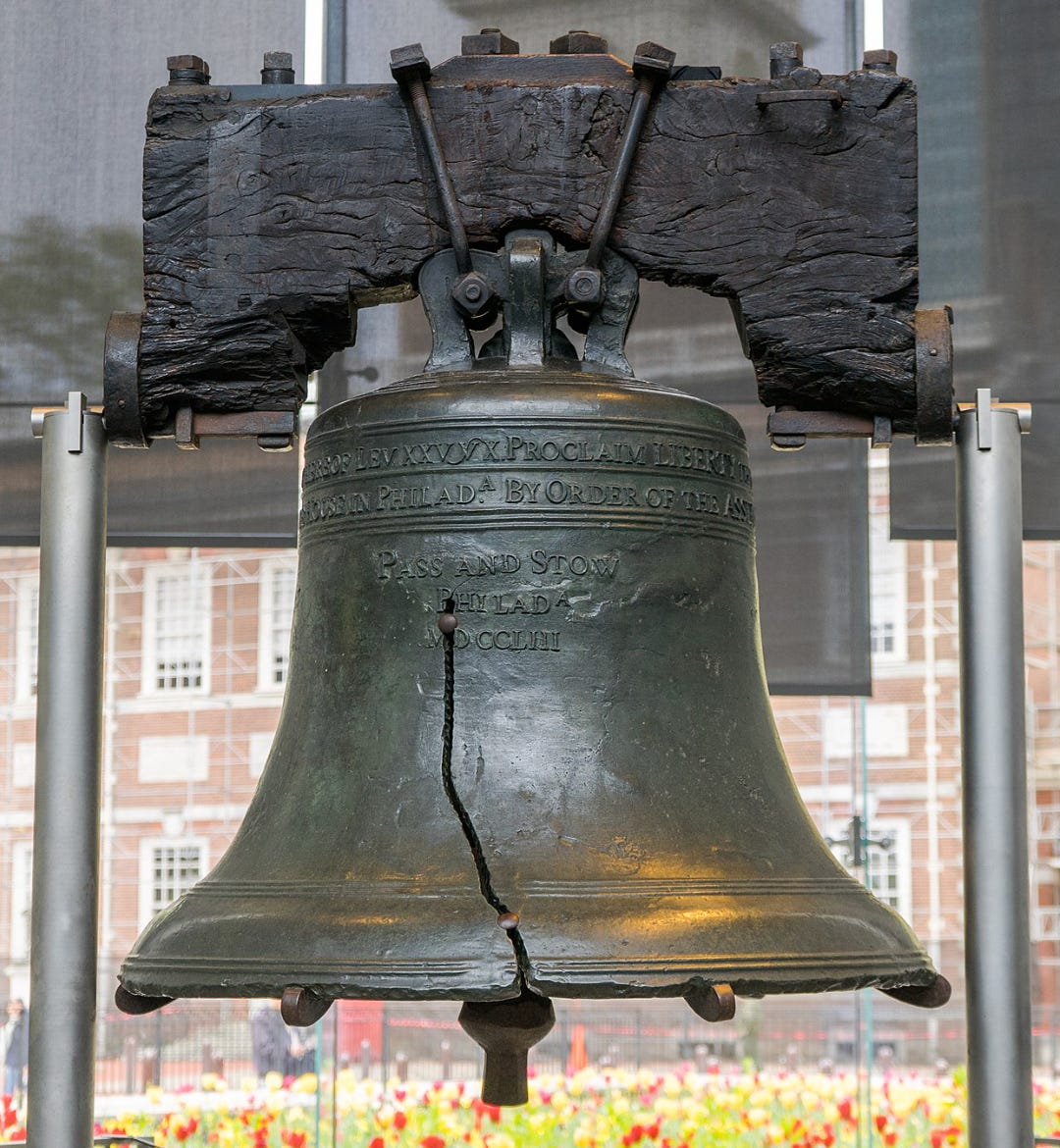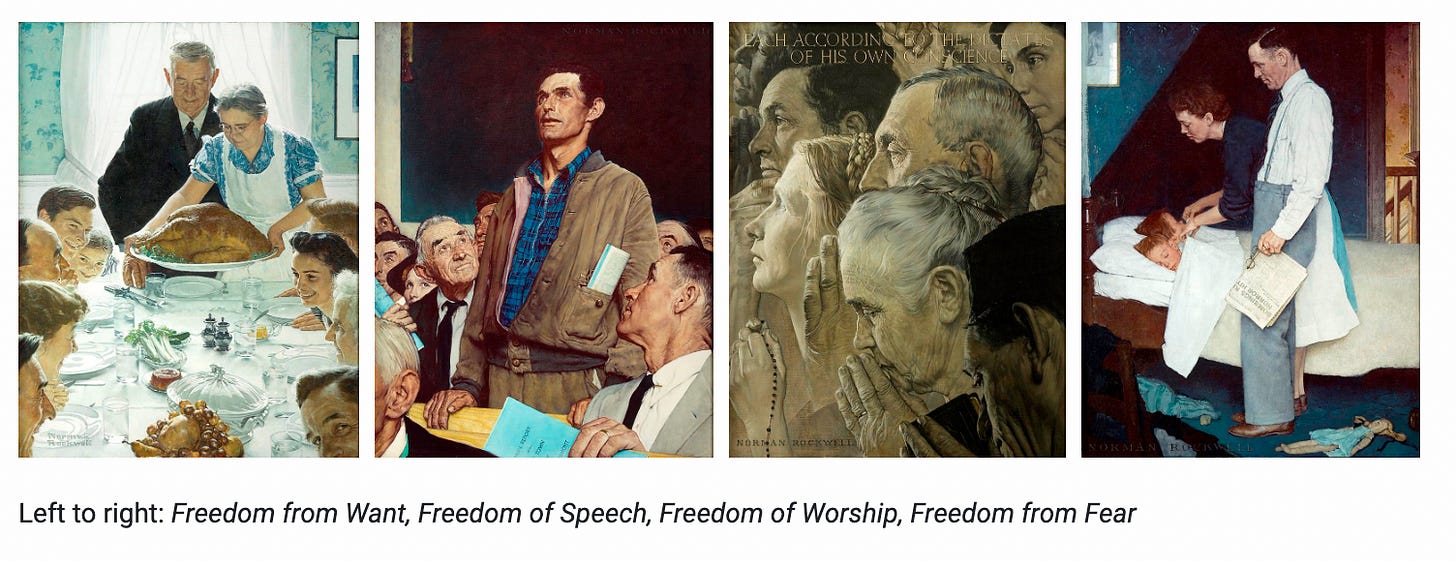Freedom
It’s the Fourth of July today, and while the state of our nation’s health may feel as precarious as that of our president, I am still going to celebrate the day. The national stress test we are currently undergoing has yet to return the final results. Who knows? We may yet emerge from this test of our democracy stronger than we entered it. Do I believe that to be the most likely outcome? Not really, no. But a boy can dream, and so today as I stare into the middle distance silently munching on a hot dog or two, I thought I would take a moment to contemplate that cherished American value over which we fought our first war: freedom.
The word means different things to different people, and has throughout our history. When we talk about the nation’s birth, we tend to interchange the words “freedom” and “independence.” I guess that makes sense, as we could not achieve our national freedom without independence from the Mother Country, just as a child must achieve independence before they can be free of the control of their parents. But independence from one authority only binds you to another. We may no longer answer to a king, but that does not mean we do not answer to anybody.
In our case, we gained our independence from one nation, only to find ourselves in debt to others: France and the Netherlands. We also granted our own citizens authority over the nation’s rulers, which created a symbiotic relationship of interdependence between the political class and the white, male landowners who controlled their fates through the ballot box. The irony of that original American freedom is that it wasn’t for all Americans, only those of the correct skin tone and genitalia.
We have always been parsimonious with freedom. Over the centuries, we’ve slowly loosened the belt, granting some measure of the stuff to those who had previously been shut out of the American experiment. As more and more people claimed the freedom withheld from them for too long, others began to identify that they, too, would like the same rights and privileges afforded to everybody else. Various civil rights movements sprung up to secure those freedoms, movements which are always met with the same response: no.
The irony of the American concept of freedom, at least the way I see it, is that it’s a freedom predicated, not on openness, but on closedness. It’s as if Americans mistakenly believe that freedom is no different from a dollar bill: granting it to one does not mean somebody else loses theirs. Allowing gay people to marry, contrary to the claims, did nothing to damage heterosexual marriage any more than desegregating the military, contrary to the claims, did nothing to destroy unit cohesion or morale.
As America grew, our idea of freedom changed with it, evolving from the freedom of self-governance to the freedom of self-destiny, the ability to create the story of one’s own life through the work of one’s own hands. That version of freedom endured through westward expansion and into the Industrial Revolution, when economic forces drove people from their agrarian pasts towards their mechanized futures.
Suddenly, technology threatened our freedoms in an entirely new way. How could a person make their own way in this young land, on their own terms, if they could not compete with a machine that could produce far more in far less time? Freedom changed again, taking on a new, more economic cast. Freedom now meant accumulation. If one accumulated enough land, money, prestige, etc., one could escape the confines our previous versions of freedom had constrained us within. This gave rise to a gilded class and those who aspired to ascend their ranks.
The nation had always retained some of the classism of its British origins, but now this class system threatened to replicate itself on our shores. Great monopolies, or trusts, were increasingly dominating the economic landscape, casting their long shadows over all of American life. We had to decide how much sway to allow private corporations to influence public life. Teddy Roosevelt, perhaps our president who best embodied the 19th century spirt of freedom-as-self-destiny, said, “Nah,” going to bat against the trusts, breaking them up and returning some small measure of authority back to the people. (I said, “small.”)
Of course, capital has its own gravitational force. Within a few decades, especially following the end of World War II, itself a fight of liberation, large American companies began reasserting themselves more forcefully into American lives. Freedom became about “working for the weekend” and “grown-up toys” and “Disneyland.” Freedom, in other words, became something to be purchased. A token to be spent as one saw fit.
The youth movements of the 1950’s and 1960’s were a challenge to this idea, recognizing the hollowness of this new, plasticky freedom. When the full expression of this counter-culture finally erupted as a response to the Vietnam War, freedom took on a new shape again, casting itself not in opposition to any foreign intervention to the nation’s affairs, but directed at the government itself. While the Civil War obviously demonstrated how America could war with itself, that was a conflict between two governmental forces; this new youth rebellion pitted a disorganized citizenry against the full institutional power of the American government.
Naturally, the government didn’t care for its authority being challenged. Governments rarely do. Years of low-level conflict ensued, with America enduring assassinations, bombings, strikes, protests, and new abuses committed by the government against its own people, using the new tools of a burgeoning surveillance state.
The presidency of Ronald Reagan recast freedom again. This time, freedom was peddled, for the first time, as the great American export. Freedom became a commodity to be traded as if on the New York Stock Exchange. After all, what the Iran-Contra Affair if not a bungled investment? The promise of Reagan’s America was a mythologized version of freedom that harkened back to a non-existent time in our history when men of good character - invariably white men - cleared the land of beast and savage for the purpose of settlement and civilization. It was a cheap Norman Rockwell version of America, at least Rockwell before he got all political and shit.
Reagan’s vision of freedom as American export was, apparently, vindicated when the Soviet Union fell during his vice president’s one and only presidential term. Now freedom became something new again, a victory flag. For a few moments, anyway, freedom became the watchword of the world as countries attempted to figure out where to go from the fall of Leninism. Russia played around with perestroika, only to retreat again to the days of the tzar with the rise of Vladimir Putin. Back at home, freedom morphed again, from a promise to a threat.
“You’re either with us or against us,” declared George W. Bush after the attacks of 9/11. Those Americans who opposed Bush’s idiotic Iraq adventure were deemed to be “against us,” and freedom now became a cudgel used to demonize the few who stood against the reckless, illegal, war. Freedom went from a word widely shared and embraced by every American to being co-opted by one political party, along with the word “patriot.” Even the flag itself, once a symbol of that freedom, took on an increasingly divisive symbology, with conservatives adopting it as a symbol of an increasingly bellicose Americanism, adopted and exploited by Donald Trump in 2015.
Today, freedom has been bastardized. Freedom, in the current conservative worldview, is the freedom to force religion into public schools under the guise of “religious freedom,” to ban books and self-expression and to curtail women’s medical freedom. The word “freedom” has taken on an Orwellian newspeak tone, its meaning the opposite of the way we’ve always understood it, to the point where the word itself now feels as fractured as the famous bell that hangs in Philadelphia. Happy Fourth of July. Enjoy your freedom.




Very well said and thought provoking. Has anyone ever told you that you’re a great writer? 😜
Thank you. Let us vote to keep our democracy.